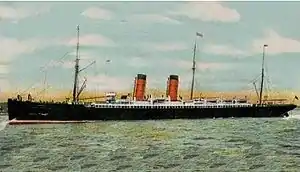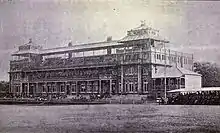Sir Alfred Joseph Karney Young KC (1 August 1864 – 5 January 1942) was a British barrister and judge. He held a number of political and judicial offices, including Attorney General of British East Africa, Chief Justice of the Seychelles, Attorney General of Fiji, Chief Justice of the Leeward Islands, Chief Justice of Fiji, and Chief Judicial Commissioner for the Western Pacific.
Early life and family
Alfred Young was born in Victoria, Colony of Vancouver Island, where his father, William Alexander George Young (c1827-1885) (later Sir William Young, CMG), was Colonial Secretary and also acting Colonial Secretary of Vancouver Island.[1] His mother was Cecilia Eliza Cowan Cameron.
Alfred Young was the youngest of three children. His brother was Sir William Douglas Young (1859–1943), Governor of the Falkland Islands from 1915 to 1920. His sister was Mary Alice Young (b. 1862), who married Frederick Mitchell Hodgson, later Governor of Gold Coast like her father.
He was educated in England at St. Mark's School, Windsor [2] (later Imperial Service College) until 1884, and graduated from Magdalen College, Oxford in 1887.[3]
Legal career
He was called to the Bar at the Inner Temple, 15 May 1889.[4] His colonial legal career began with an appointment (possibly as Crown Prosecutor) in the British administration of British Honduras (now Belize),[5] where he compiled a list of the colony's laws,[6] and made a report on the 1901 Census.[7]

In April 1893 he sailed on the RMS Etruria from New York for Liverpool (also on board was the Governor of British Honduras, Sir Alfred Moloney).[8]
Young was appointed Crown Prosecutor in the Seychelles in 1903,[9] where he made the decennial revision of the current list of laws of the Seychelles.[10] He served as Attorney General of the British Central Africa Protectorate from May 1906 [11] and Stipendiary Magistrate in Trinidad before being appointed Chief Justice of the Seychelles in 1909.[12]
In June? 1914 (just before the outbreak of World War I) he was appointed Attorney General of Fiji, which included his being made an Official Member of the Legislative Council of Fiji.[13]
He was in Sydney in June 1920, the guest at a rugby match of the Governor of New South Wales, Sir Walter Davidson.[14] Davidson had been Governor of the Seychelles when Young was Crown Prosecutor and Attorney General there. In November 1920 Young was appointed Chief Justice of the Leeward Islands,[15] and in 1921 as a member of the Fijian Legislative Council.[16] He was appointed Chief Justice of Fiji and Chief Judicial Commissioner for the Western Pacific in December 1922,[17] and received a knighthood the following year.[18][19] He was in Sydney again in April 1927.[20]
1928 Royal Commission
In 1928 Young headed a Royal Commission to investigate whether the swimming baths in the capital, Suva, operated a 'Europeans-only' policy.
Since 1879 the colony of Fiji had imported indentured workers (as cheap labour) from India to work in the European-owned plantations, which produced (according to demand) sea island cotton from the late 1860s to the early 1870s, then copra, then sugarcane from around 1880. This Indian immigration (which ended in 1916) came about because the Pacific Islands (particularly the New Hebrides and the Solomon Islands) couldn't provide enough labour. These islands provided labour from 1864 to 1911, when the European planters in the Solomon Islands and the New Hebrides brought about legislation to prevent emigration from those islands.[21]
The involvement of the Indian Army and India generally during the First World War had convinced the colonial Indian Government of the necessity of enfranchising all Indian citizens, and this was granted in 1917.[22] This move towards "responsible government" included Indians living in Fiji, which replicated in some degree the political motivation and agitation which within India pushed towards the Dominion status enjoyed by Canada, Australia, New Zealand and South Africa.
Moves towards independence continued to gather pace during Young's time as Chief Justice in Fiji, where many time-served previously indentured labourers from India had stayed on to live permanently. In 1928, Indian Fijians began to complain about low numbers of enfranchised rate-payers in Suva, and about a perceived 'Europeans-only' policy of segregation in the two municipally-run public Suva swimming baths . The Governor, Sir Eyre Hutson appointed a Committee to investigate the municipal matter. The committee split into three factions which each produced a report on the situation. The disagreement between the three groups led to the Governor appointing Young to head a Royal Commission: he found that there had been a policy of segregation, which was brought to an end.[23]
Cricketing career
Alfred Young played cricket twice for Kent County Cricket Club, once in 1887 and again in 1890. The latter match, against MCC at Lord's, was his only first-class cricket appearance. He also played for Rochester Cricket Club. According to his Wisden obituary, he was "a sound, steady batsman, showing special skill in placing the ball off his legs and late cutting".[24]
Young was an early pioneer of cricket in British Honduras, his first posting in the judiciary of the British colonial administration.[25]
Later life and death
He retired in 1929, and married Frances May Buckley (née Miller) (1875–4 October 1952) on 19 April 1930. Her parents were Sir Henry Miller (9 September 1830 – 7 February 1917) and Jessie Orbell (d. 23 July 1920). Frances was the widow (married 14 June 1899) of St. John McLean Buckley, a wealthy New Zealand sheep rancher who died in 1916.
Young was later appointed a Resident Magistrate in Cape Town, South Africa, and died there in Tamboerskloof on 5 January 1942, aged 76.[26] A brief notice of his death appeared in the New Zealand Herald.[27]
Selected publications
- Young, Alfred Joseph Karney (1897). British Honduras: A Collection of the Ordinances in Force, 3rd July, 1897. Waterlow & Sons Limited, printers, 1897.
- Young, A. K. (1901). Report on the result of the Census of the Colony of British Honduras, taken on the 31st March, 1901. Belize: Printed at "The Angelus" Office. (The Angelus was a Belize newspaper.)
- Herchenroder, Furcy Alfred (1904). Young, A. K. (ed.). The laws of Seychelles (3 Vols. 1872–1898, revised ed.). Government Printing Office.
[F. A. Herchenroder[28] was the first Chief Justice of the Seychelles.]
References
Citations
- ↑ Hendrickson 2000.
- ↑ "History of The Imperial Services College, Windsor by ThamesWeb". thamesweb.co.uk.
- ↑ Foster 1893, p. 679.
- ↑ Guyot 1907, p. 310.
- ↑ Proceedings of the Royal Colonial Institute, Volume XXIII, 1891–92. Present at session's 1st ordinary general meeting: Alfred J. K. Young, B.A.
- ↑ Young 1897.
- ↑ Young 1901.
- ↑ New York Herald 30 April 1893 p. 12, col. 3
- ↑ Durup, Julien (2008). "The First Chief Justice of the Seychelles". Seychelles-eNews. Retrieved 27 December 2022.
- ↑ Herchenroder 1904.
- ↑ The London Gazette, 18 May 1906, p. 3465
- ↑ The London Gazette, 9 July 1909, p. 5283
- ↑ Alfred Karney Young, Esq., to be "Official Member" of the Legislative Council of the Colony of Fiji. The London Gazette, 25 August 1914 p. 6684
- ↑ "07 Jun 1920 – PERSONAL. VICE-REGAL". nla.gov.au.
- ↑ Appointments by the Secretary of State for the Colonies, November 1920. Mr. A. K. Young (Attorney General, Fiji), Chief Justice, Leeward Islands. Royal Colonial Institute Journal, Vol. XII (New Series) 1921, page 56
- ↑ Downing Street, 25 January 1921: The King has been pleased to confirm the appointment of — Alfred Karney Young, Esq.', K.C. (Attorney General) to be nominated Members of the Legislative Council of the Colony of Fiji.The London Gazette, 28 January 1921, p.779
- ↑ The King has been pleased to give directions for the appointment of Alfred Karney Young, Esq~. (Chief Justice, Leeward Islands), to be Chief Justice of Fiji and Chief Judicial Commissioner for the Western Pacific.The London Gazette, 5 December 1922 (Also, coincidentally on the same page, there is a NOTICE OF INTENDED DISTRIBUTION OF NAVAL SALVAGE MONEY by the Department of the Accountant-General of the Navy, 5 December 1922; this was familiar territory to Maxwell Maxwell-Anderson, (counsel for the Admiralty in the Prize Court from 1916 to 1918) who succeeded Sir Arthur Young as Chief Justice of Fiji...)
- ↑ The KING has been graciously pleased to signify His Majesty's intention of conferring the honour of Knighthood on the following: — Alfred Karney Young, Esq., Chief Justice of the Leeward Islands; Chief Justice designate of the Supreme Court of Fiji, and Judicial Commissioner for the Western Pacific.Supplement to "The London Gazette" of 29 December 1922
- ↑ His Knighthood was conferred at Buckingham Palace on 15 February 1923.The London Gazette,15 February 1923
- ↑ "Sir Alfred Young, Chief Justice of Fiji, will sail from Sydney today on the Niagara on his return to Suva."The Sydney Morning Herald, 7 April 1927
- ↑ Shlomowitz 1986, pp. 109–111.
- ↑ Daley 1996, p. 43.
- ↑ Daley 1996, p. 124.
- ↑ Young, Sir Alfred Karney, Obituaries in 1942 Wisden Cricketers' Almanack, 1943. Retrieved 2017-06-04.
- ↑ Belize National Cricket Association, International Cricket Council. Retrieved 2017-06-04.
- ↑ "Wisden – 1943 – Obituaries in 1942". Wisden Cricketers' Almanack. Retrieved 27 September 2008.
- ↑ "Death at Capetown: former official in Fiji". New Zealand Herald, 7 January 1942, p. 8, col. 1 (last item).
- ↑ Durup, Julien (2008). Chief Justice of the Seychelles. Retrieved 24 September 2015.
Sources
- Adams, John David (2001). Old Square-Toes and His Lady. Victoria, BC: Horsdal and Schubart. ISBN 9780920663776.
- Daley, Kevin (1996). Communalism and the challenge of Fijian unity (PDF) (Thesis). (D.Phil. dissertation)
- Debrett's House of Commons and the judicial bench. London: Dean & Son.
- Foster, Joseph (1893). Oxford men & their colleges. Oxford & London: James Parker & Co. p. 679.
- Girard, Charlotte S.M. (Autumn 1977). "Sir James Douglas' School Days". BC Studies. University of British Columbia. 35. ISSN 0005-2949.
- Girard, Charlotte S.M. (1979). "Sir James Douglas' Mother and Grandmother". BC Studies. University of British Columbia. 44. ISSN 0005-2949.
- Girard, Charlotte S.M. (1986). "Some Further Notes on the Douglas Family". BC Studies. University of British Columbia. 72. ISSN 0005-2949. [This work continues the pioneering research of Lamb 1953.]
- Guyot, Joseph Nicolas (1907). The Law List, 1907. p. 310.
- Herchenroder, Furcy Alfred (1904). Young, A. K. (ed.). The laws of Seychelles (3 Vols. 1872–1898, revised ed.). Government Printing Office.
- Hendrickson, James E. (2000). "Young, Sir William Alexander George". Dictionary of Canadian Biography Online 1881–1890, vol. XI.
- Hunter, Teresa (2000). "Pioneer ships in British Columbia". In Basque, Garnet (ed.). Frontier Days in British Columbia. Heritage House Publishing Co. ISBN 9781894384018.
- Lamb, W. Kaye (January–April 1953). "Some notes on the Douglas family" (PDF). British Columbia Historical Quarterly. Victoria, B.C.: Archives of British Columbia. XVII (1 & 2): 41–53.
- Massue, Melville Henry (Marquis of Ruvigny and Ranieval) (2013) [1911]. The Plantagenet Roll of the Blood Royal: The Mortimer-Percy Volume. The Plantagenet roll...being a complete table of all the descendants now living of Edward III, king of England. Heritage Books. p. 522. ISBN 9780788418723.
- Sampson, William R. (1972). "Cameron, David". Dictionary of Canadian Biography Online. University of Toronto. Retrieved 18 December 2010.
- Shlomowitz, Ralph (July 1986). "The Fiji labor trade in comparative perspective, 1864–1914". Pacific Studies. 9 (3).
- Streeter, Anne P. (2012). Joseph S. Harris and the U.S. Northwest Boundary Survey, 1857–1861. Trafford Publishing. ISBN 9781466936218.
External links
- History of the Seychelles in 1909 at the Seychelles Nation
